A night patrol with India's cow protection vigilantes
- Published
Nawal Kishore Sharma explains how the vigilante patrols work
The men leap out of the darkness at a fork in a lonely village crossroad well past midnight.
It is a bright, moonlit night, pregnant with the promise of a frosty winter. The landscape is etched with silhouettes of hills and trees. Now more than a dozen men, looking like ghostly apparitions, complete the picture.
"Any information about vehicles in the neighbourhood?" barks Nawal Kishore Sharma, who is inspecting this stakeout in a hamlet in Rajasthan.
The men shake their heads.
"Nothing so far," says one of them. "It's all very quiet tonight."
The bike-borne Mr Sharma is a rakish man of sorts. He has shiny oiled hair and a neat beard. He is clad in fraying blue denim, a pale blue shirt and khaki sneakers. He has, by his own admission, two wives and five children.
By day, Mr Sharma makes marble figurines of deities for a living. By night, he's a fire-spewing leader of a thriving group of radical Hindu vigilantes belonging to a cow protection group in Ramgarh, a cluster of some 70 villages.
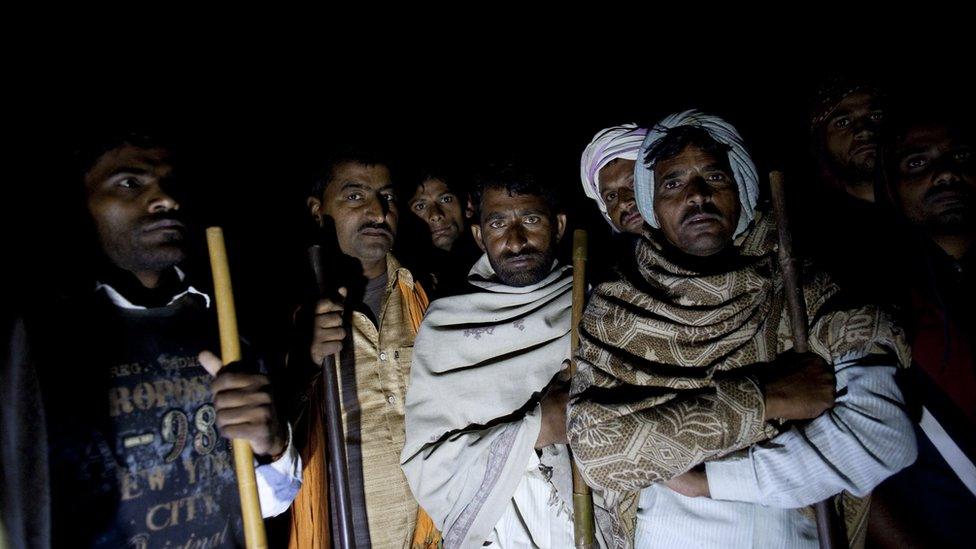
Hysteria and violence
Several nights a week Mr Sharma marshals his "patrolling soldiers", as he calls them, to keep a watch on what they say are smugglers illegally transporting cows to sell for slaughter.
Groups, external like his are thriving thanks to the rising hysteria and sporadic violence, external over slaughter of cows and consumption of beef in India. Ruling BJP governments in states have tightened laws, external on both. The cow, venerated by India's majority Hindu people, has re-emerged as India's most polarising animal.
Mr Sharma's "soldiers" are a rag-tag, but committed bunch of vigilantes who are mostly members of militant Hindu groups like Bajrang Dal, Vishwa Hindu Parishad (World Hindu Council) and Shiv Sena. All of them attend local camps held by the right-wing Hindu nationalist Rashtriya Swayamsevak Sangh (National Volunteers' Organisation), which has umbilical ties with the ruling BJP.
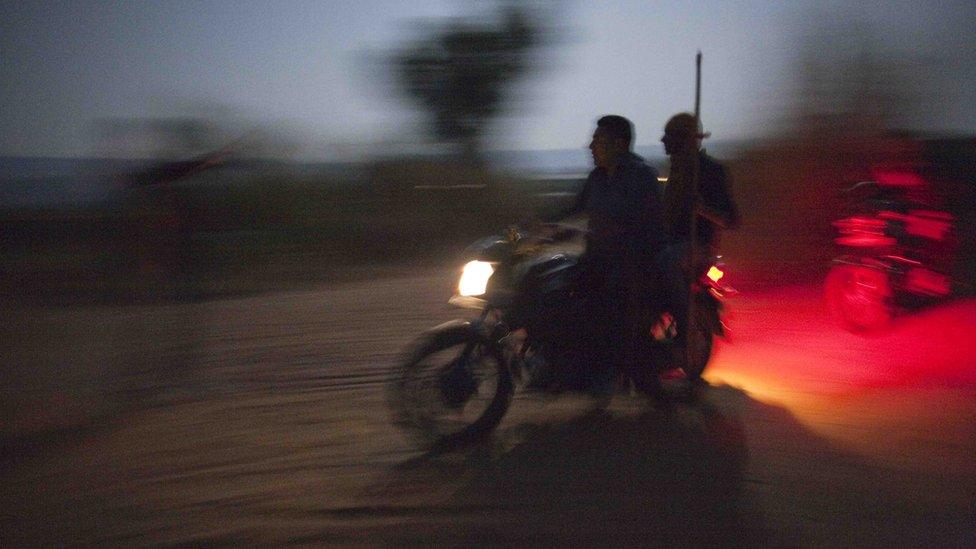
Vigilantes on bikes check the stakeouts at night
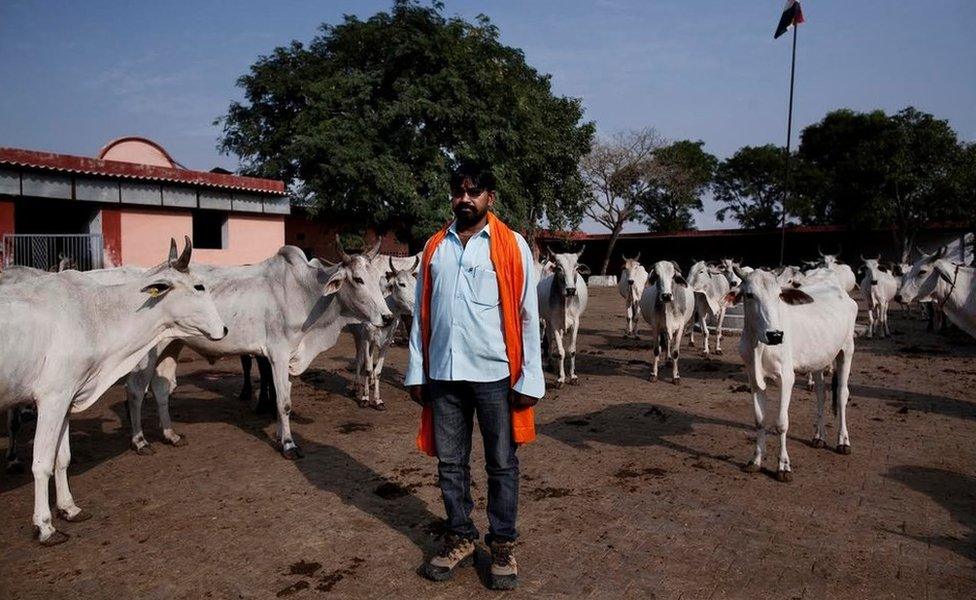
Nawal Kishore Sharma is one of the leaders of the cow protection groups
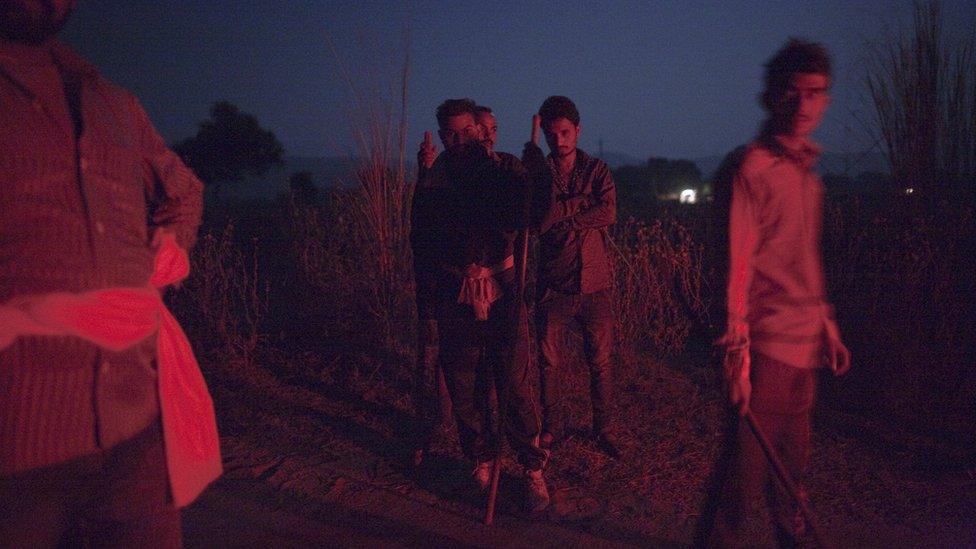
The vigilantes usually hide in the farms near village crossroads
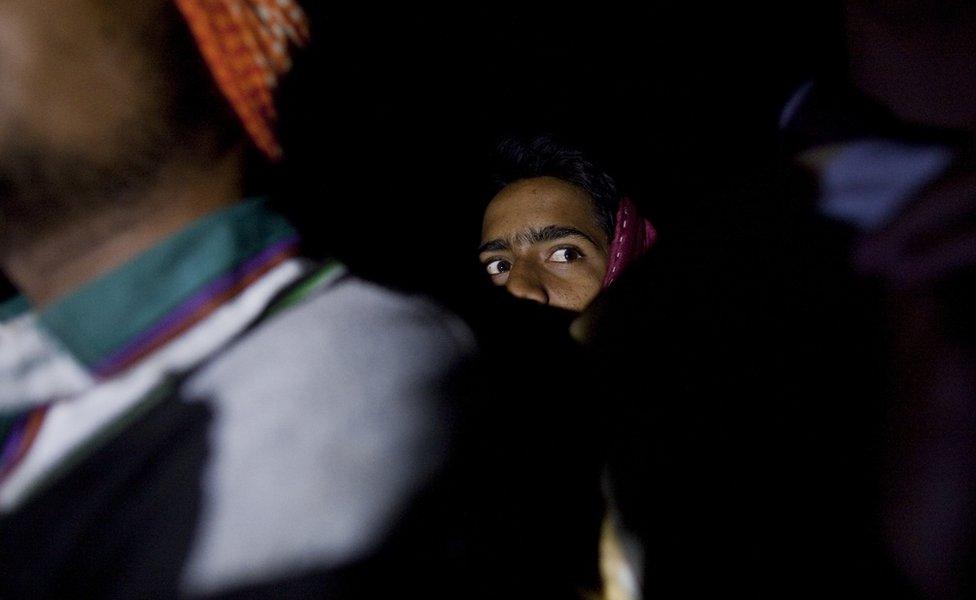
Many of them are students, teachers and lawyers
Some of them are as young as 15. They are a motley crew of farmers, shop owners, teachers, students, masons, doctors and the jobless. On the night I went out with a group, I met a TV repairman, a Sanskrit teacher, and a TV journalist, who were looking to catch cow smugglers. There were two polytechnic students.
They are mainly vegetarian and many say they drink cow urine for a "healthy life". Many of them, including Mr Sharma himself, believe that the Muslim man who was lynched by a Hindu mob over rumours of storing and consuming beef deserved his fate, and "when fights happen, people do get killed".
All of them believe that "mother cow" is endangered, and conflate saving the cow with saving Hinduism. "The cow will become extinct within 20 years if we don't save them now," says Suraj Bhan Gujjar, a farmer. Although there are rising concerns over cattle smuggling, external in border areas, India has more than 100 million cows and buffaloes, external, and it's one of the top milk producing countries in the world.
So night after night, spurred by myth and fervour, they stake out at village crossroads, looking to waylay vehicles and looking for the quarry they are trying to save. They say cows are smuggled in pick-up trucks, SUVs, even ambulances and buses, and are taken to abattoirs in neighbouring states.
False alarm
The vigilantes are armed with sturdy batons, baseball bats, sticks, stones, machetes and sickles mounted on sticks. They use beds of nails on wooden slabs as road blocks to stop vehicles. When the going gets tough, they chase the smugglers on their bikes.
The battle to save the cow appears to be a bit asymmetrical: the smugglers often fire in the dark to ward them off and the two sides often end up in high speed chases. "We are experts in dodging bullets. We jump into the fields when the smugglers open fire," says Babulal Prajapati, the TV repairman.
There is no such dramatic action tonight.
There is a false alarm at one stakeout - somebody spots a speck of light in the distance, and the vigilantes dive into the fields. The light flickers out. It is not from a vehicle.
Another patrol stops a truck trundling down a dirt track. Excitement mounts, and the vigilantes clamber up the vehicle. More disappointment: it is stuffed with pigs bound for markets in Delhi.
The driver is Zakir Hussain. You are a Muslim, and you are carrying pigs? asks a bemused vigilante. "I transport everything for a living," says Mr Husain wryly.
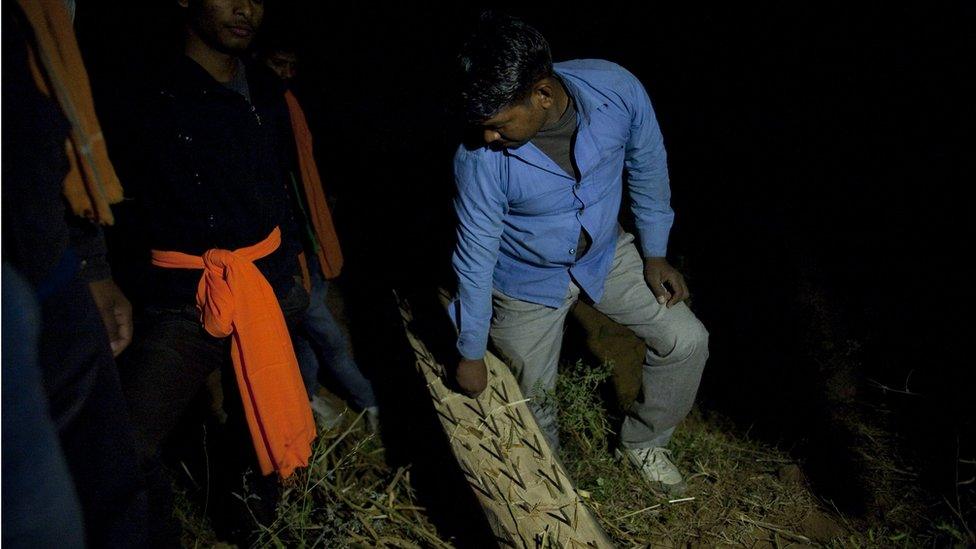
The vigilantes put up road blocks to stop the smugglers' vehicles
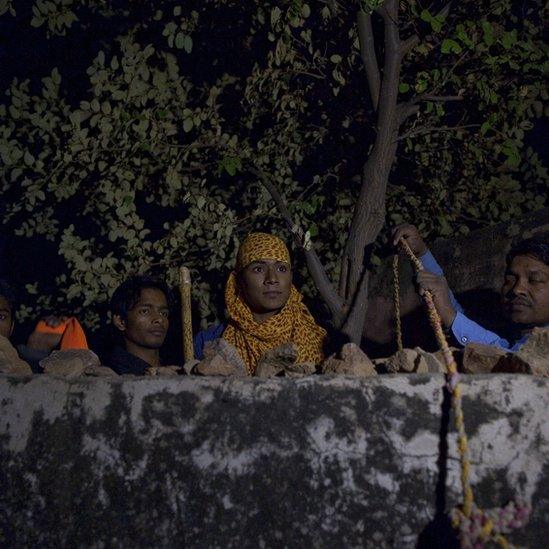
The vigilantes are mostly members of militant Hindu groups
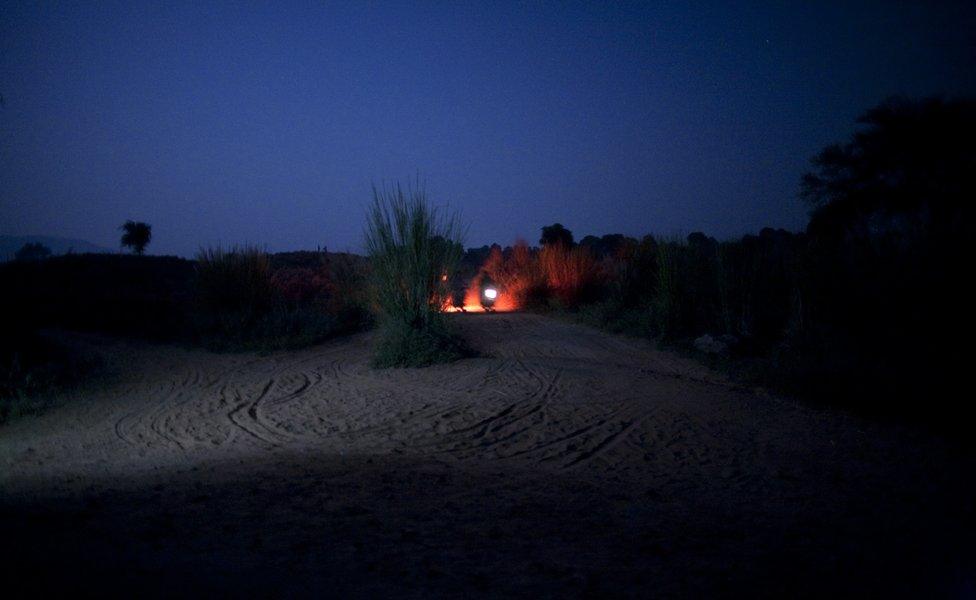
The vigilantes work on dusty village dirt tracks several nights every week
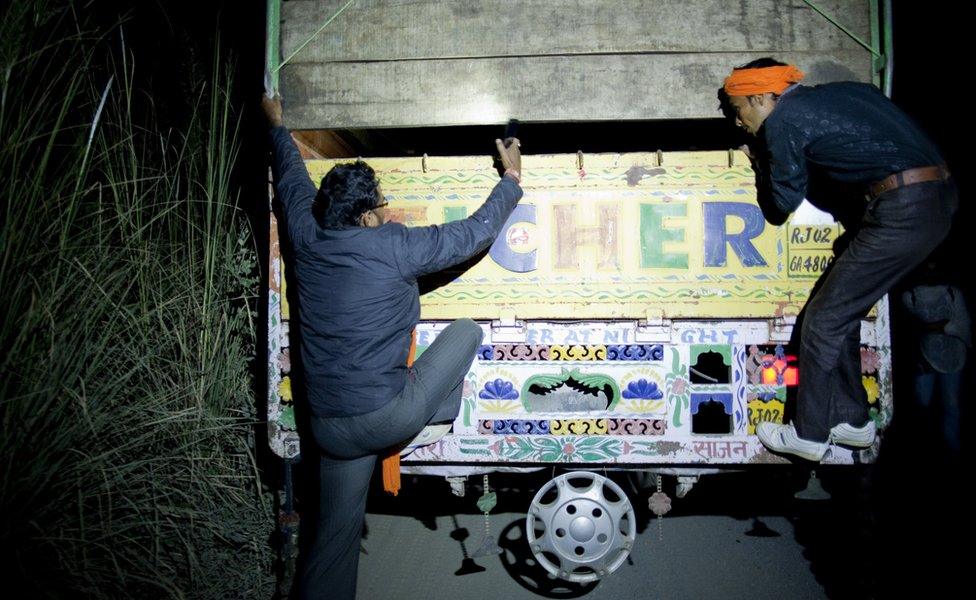
The vigilantes clamber up a truck and find it is carrying pigs
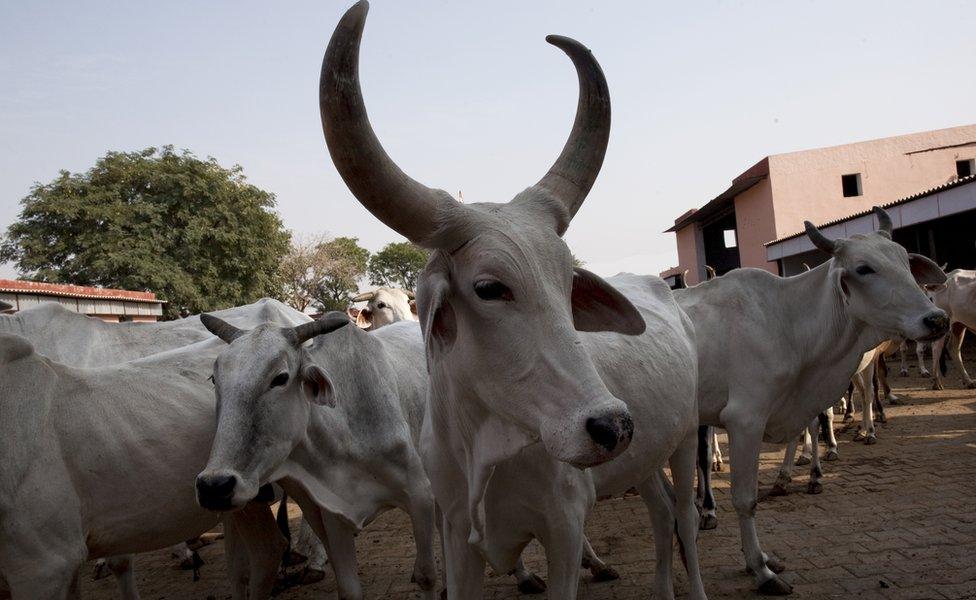
The rescued cows are sent to two shelters in Ramgarh
As the futile search for the holy cow wears on, camels dragging carts suddenly loom in the moonlit darkness on a narrow dirt track. The vigilantes gasp and make way. The night is full of slight surprises.
The group claims to have rescued 18,000 cows and sent them to shelters since it began work in 1992. It says most of the smugglers escape under the cover of darkness. The "rescued" cows are sent to two cow shelters in the district.
'Working harder'
Records at the local police station show only half a dozen registered cases of cow smuggling and four smugglers arrested so far this year; last year, there were seven such cases. A dozen smugglers' vehicles, seized by the police, are rotting near the police station. "We take complaints of cow smuggling very seriously. And the protection groups helps us catch then," says policeman Dhruv Singh.
Things are getting better with a friendly ruling government though.
"We are working harder these days. Our efforts are getting support. The local BJP lawmaker, party leaders are all helping us in our mission. The police take us more seriously, the authorities are listening to us," says Mr Sharma.
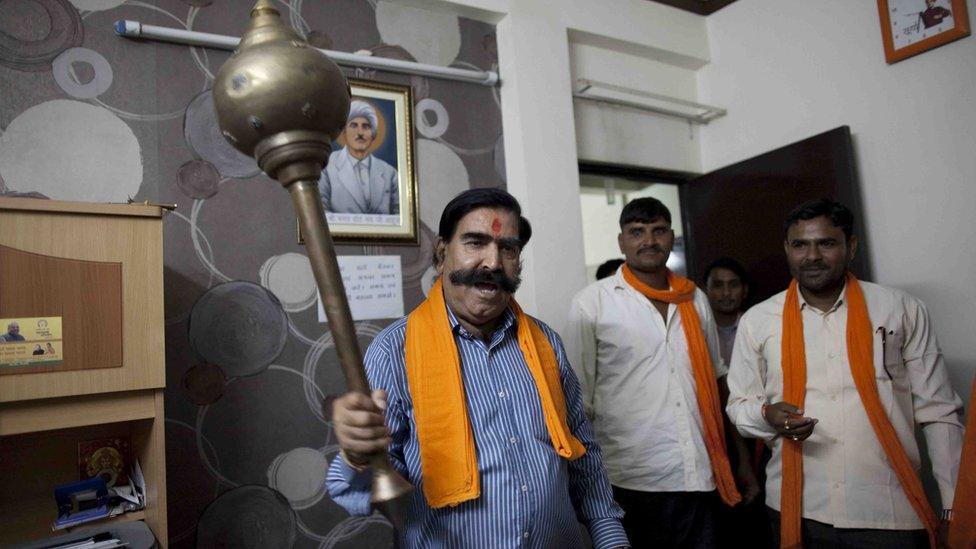
BJP lawmaker Gyan Dev Ahuja says he supports the cow vigilantes
In the neighbouring Alwar town, the local BJP lawmaker Gyan Dev Ahuja makes no bones about his support for the vigilantes.
"I give them money, I give them support, I hold classes on the virtues of cow," he tells me.
A sample of his lessons: California is entirely electrified by cow dung fuel or biogas, cow milk contains traces of gold; and foreign experts say killing cows in India will "lead to volcanoes, earthquakes and drought".
"Still," he sighs, "the cow is not being given enough importance in India."
"That is why I support the vigilantes. They have a mission. It's about saving India's soul. It's about Hindutva (Hinduness)."
- Published15 October 2015